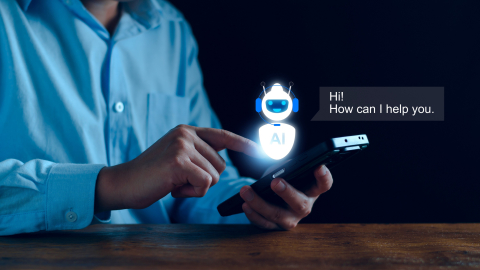ChatGPT - Will OpenAI's chatbot lead us into the future?
Since OpenAI released its ChatGPT bot in November 2022, numerous users have been experimenting with the tool. "GPT" stands for "Generative Pre-training Transformer". This is an artificial intelligence that is used to generate human-like texts.
We found the topic so interesting that it was recently discussed in one of our internal learning circles, the ITalks. In our latest blog post, we asked our colleague and course instructor Jonas for more details.

What is the basic principle of ChatGPT?
Jonas: ChatGPT uses a language model trained by OpenAI. The use of very large amounts of data and the additional "fine-tuning" to more specific tasks and areas of application ensures that ChatGPT can deal with almost all questions.
The chatbot can be asked questions in a total of 95 different languages. To generate an output, a question is translated into English, answered and then translated back into the input language. However, the user only notices this in exceptional cases.
The chatbot can be started from any current web browser.
What is special about Open AI's chatbot?
Jonas: The special thing about ChatGPT is the huge difference to previous solutions. Of course, ChatGPT is not (yet) perfect, but it is definitely far ahead of other chatbots.
This starts with the input of the question. Questions can be asked in natural language and answers are also given in detail in natural language. ChatGPT even copes with grammatical and spelling mistakes and delivers the desired answers without any problems. The chatbot also takes into account the previous course of the conversation to enable follow-up questions or more detailed follow-up. All of this ensures that the chat feels natural and that you get the answer you were looking for.
One interesting application area for developers is the creation of programme code in various programming languages. For example, a list of requirements is translated into source code, which can often be used in the same way.
What are the limitations of ChatGPT?
Jonas: Despite all the interesting possibilities that ChatGPT offers, the chatbot should often still be used with caution. If you want to work more intensively with ChatGPT, you quickly realise that errors can occur even with simple questions.

Caption: Example of a question posed to ChatGPT.
As a result, confidence in the accuracy of the answers generally suffers and you often want to check with other sources. An example of this is the creation of programme code. As mentioned above, ChatGPT can create source code based on requirements. Even if the result often looks promising, you cannot rely on best practices being implemented here. In addition, it has already happened that ChatGPT has invented method names that did not exist in the package used. I would therefore generally advise against blindly copying/pasting chatbot responses.
Another limitation of ChatGPT is that the training is based on data collected up to 2021. Developments that occurred after this date can therefore not be taken into account.
Is ChatGPT leading us into the future?
Jonas: I think that ChatGPT has great potential and can be helpful in many subject areas and professional fields. I could imagine, for example, that some tasks could be taken over in the area of product support. The specialised knowledge of ChatGPT is already amazing in the standard version. Training the model in a specific area could certainly achieve even more here.
I also find it interesting that the search engine Bing is currently working on an integration of ChatGPT, which should enable access to current data. Perhaps the way we search for information on the Internet will soon change.
As already mentioned, the step from previous chatbots is also very surprising. Development is moving fast and ChatGPT is probably just a foretaste of how we might experience the internet in the future.
Do you see the danger that Chat GPT could automate the IT industry and thus professions such as software developers, web developers, computer programmers or programmers?
Jonas: When I tested ChatGPT for the first time, I actually had the initial feeling that we could soon be overtaken by an AI. However, after using it more intensively, I still see a long way to go before it could really get that far. During my tests, especially in the area of software development, I often came up against limits and frequently recognised inaccuracies.
This has already happened with less complex problems. The realisation of comprehensive projects, which often require a large number of factors to be considered, is a long way off for a chatbot like ChatGPT.
What innovations could artificial intelligence bring and what does this mean for developers?
Jonas: AI is developing rapidly and will certainly be able to provide increasingly precise answers to a wide range of problems in the foreseeable future. For now, I could imagine using tools like ChatGPT as a replacement for web searches. The chatbot can already be a great help in finding solutions. Questions can often be asked more precisely by entering any amount of detailed, natural language than you could by entering a few keywords in a Google search.
I'm certainly looking forward to seeing how AI can help us in our day-to-day work in the future.
Thank you Jonas for the interesting interview!